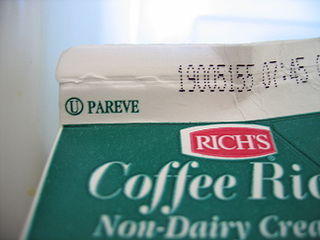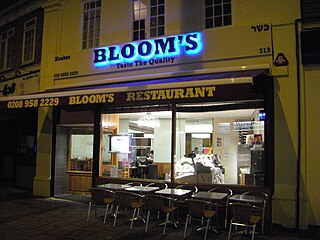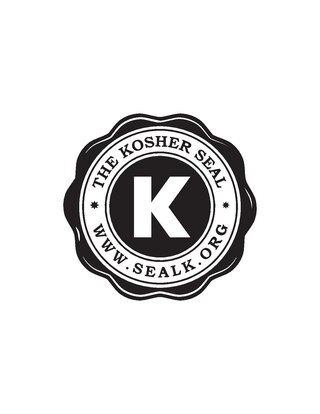Related Research Articles
Kashrut is a set of dietary laws dealing with the foods that Jewish people are permitted to eat and how those foods must be prepared according to Jewish law. Food that may be consumed is deemed kosher, from the Ashkenazi pronunciation of the term that in Sephardi or Modern Hebrew is pronounced kashér, meaning "fit". Food that may not be consumed, however, is deemed treif, also spelled treyf. In case of objects the opposite of kosher is pasúl
A hechsher or hekhsher is a rabbinical product certification, qualifying items that conform to the requirements of Jewish religious law.

A mashgiach or mashgicha is a Jew who supervises the kashrut status of a kosher establishment. Mashgichim may supervise any type of food service establishment, including slaughterhouses, food manufacturers, hotels, caterers, nursing homes, restaurants, butchers, groceries, or cooperatives. Mashgichim usually work as on-site supervisors and inspectors, representing a kosher certification agency or a local rabbi, who actually makes the policy decisions for what is or is not acceptably kosher. Sometimes certifying rabbis act as their own mashgichim; such is the case in many small communities.
Kosher foods are foods that conform to the Jewish dietary regulations of kashrut. The laws of kashrut apply to food derived from living creatures and kosher foods are restricted to certain types of mammals, birds and fish meeting specific criteria; the flesh of any animals that do not meet these criteria is forbidden by the dietary laws. Furthermore, kosher mammals and birds must be slaughtered according to a process known as shechita and their blood may never be consumed and must be removed from the meat by a process of salting and soaking in water for the meat to be permissible for use. All plant-based products, including fruits, vegetables, grains, herbs and spices, are intrinsically kosher, although certain produce grown in the Land of Israel is subjected to other requirements, such as tithing, before it may be consumed.

In kashrut, the dietary laws of Judaism, pareve or parve is a classification of food that contain neither dairy nor meat ingredients. Food in this category includes all items that grow from the ground, fish, eggs, and non-biological edible items.

OK Kosher Certification is a major kosher certification agency based out of Brooklyn, NY. It is one of the "Big Five," the five largest kosher certifying agencies in the United States. OK also has a large kosher presence in Asia.

The Islamic dietary laws (halal) and the Jewish dietary laws are both quite detailed, and contain both points of similarity and discord. Both are the dietary laws and described in distinct religious texts: an explanation of the Islamic code of law found in the Quran and Sunnah and the Jewish code of laws found in the Torah, Talmud and Shulchan Aruch.

Triangle K is a kosher certification agency under the leadership of Rabbi Aryeh R. Ralbag. It was founded by his late father, Rabbi Yehosef Ralbag. The hechsher is a letter K enclosed in an equilateral triangle.

A kosher restaurant or kosher deli is an establishment that serves food that complies with Jewish dietary laws (kashrut). These businesses, which also include diners, cafés, pizzerias, fast food, and cafeterias, and are frequently in listings together with kosher bakeries, butchers, caterers, and other similar places, differ from kosher-style businesses in that they operate under rabbinical supervision, which requires the observance of the laws of kashrut, as well as certain other Jewish laws, including the separation of meat and dairy.
The Tav HaYosher is a certification mark offered, free of charge, to Kosher food establishments that meet a series of ethical criteria developed by the organization, Uri L'Tzedek. Particularly, the Tav HaYosher confirms that an eating establishment with its seal pays minimum wage to all employees and overtime to those employees working more than 40 hours a week. It also ensures the establishment offers employees appropriate breaks as required by law, and provides a safe and abuse-free working environment.

EarthKosher is an American company providing kosher certification. The main office is in Boulder, Colorado, with offices in California, New Jersey, Mexico City and Jerusalem. It is a member of the Association of Kashrus Organizations.

Kosher Check is a hechsher of the Orthodox Rabbinical Council of British Columbia. Its symbol is used on labels of food which are certified Kosher by the Council. Kosher Check is headquartered in Vancouver, British Columbia.
The "Kosher tax" is the idea that food companies and unwitting consumers are forced to pay money to support Judaism or Zionist causes and Israel through the costs of kosher certification. The claim is a conspiracy theory, antisemitic canard, or urban legend.
A kosher certification agency is an organization or certifying authority that grants a hechsher to ingredients, packaged foods, beverages, and certain materials, as well as food-service providers and facilities in which kosher food is prepared or served. This certification verifies that the ingredients, production process including all machinery, and/or food-service process complies with the standards of kashrut as stipulated in the Shulchan Arukh, the benchmark of religious Jewish law. The certification agency employs mashgichim to make periodic site visits and oversee the food-production or food-service process in order to verify ongoing compliance. Each agency has its own trademarked symbol that it allows manufacturers and food-service providers to display on their products or in-store certificates; use of this symbol can be revoked for non-compliance. Each agency typically has a "certifying rabbi" who determines the exact kashrut standards to be applied and oversees their implementation.

Seal-K Kosher is a kosher certification organization. The organization provides kosher supervision and certification for commercial kitchens, in addition to certifications for food production and shaatnez testing. The organization has its office in Chicago in 2021.

Kof-K, a Teaneck, New Jersey–based Kosher certification agency, is one of the "Big Five."

Orthodox Union Kosher, known as OU Kosher or OUK, is a kosher certification agency based in New York City. It was founded in 1923 by Abraham Goldstein. It is the certification agency of about 70% of kosher food worldwide, and is the largest of the "Big Five" major certification agencies, which include OK, Kof-K, Star-K, and CRC.
Kosher by ingredient is an approach to observing the laws of kashrut that determines whether a food is kosher or not based on ingredient, rather than by the presence of a hechsher. This approach has fallen out of favor with Orthodox Jews, but is practiced by many Conservative Jews as well as by some Reform Jews and Reconstructionist Jews.
Bitul or batel is a concept in kashrut that stipulates that food is still considered kosher if a small amount of forbidden food is mixed with a permitted food, such as a drop of milk in a meat dish. Bitul b'shishim is the concept that a dish is kosher if the prohibited food is less than one-sixtieth of the entire dish. Bitul barov is the concept that a dish is kosher if less than one-half of the meal contains prohibited food.
Tablet-K is a kosher certification agency that was under the leadership of Rabbi Rafael Saffra until his death in 2009.
References
- ↑ "NO HECHSHER REQUIRED". Star-K . Retrieved 2023-04-12.
- ↑ "Food that Doesn't Require Kosher Certification". Kashruth Council of Canada . Retrieved 2023-04-12.